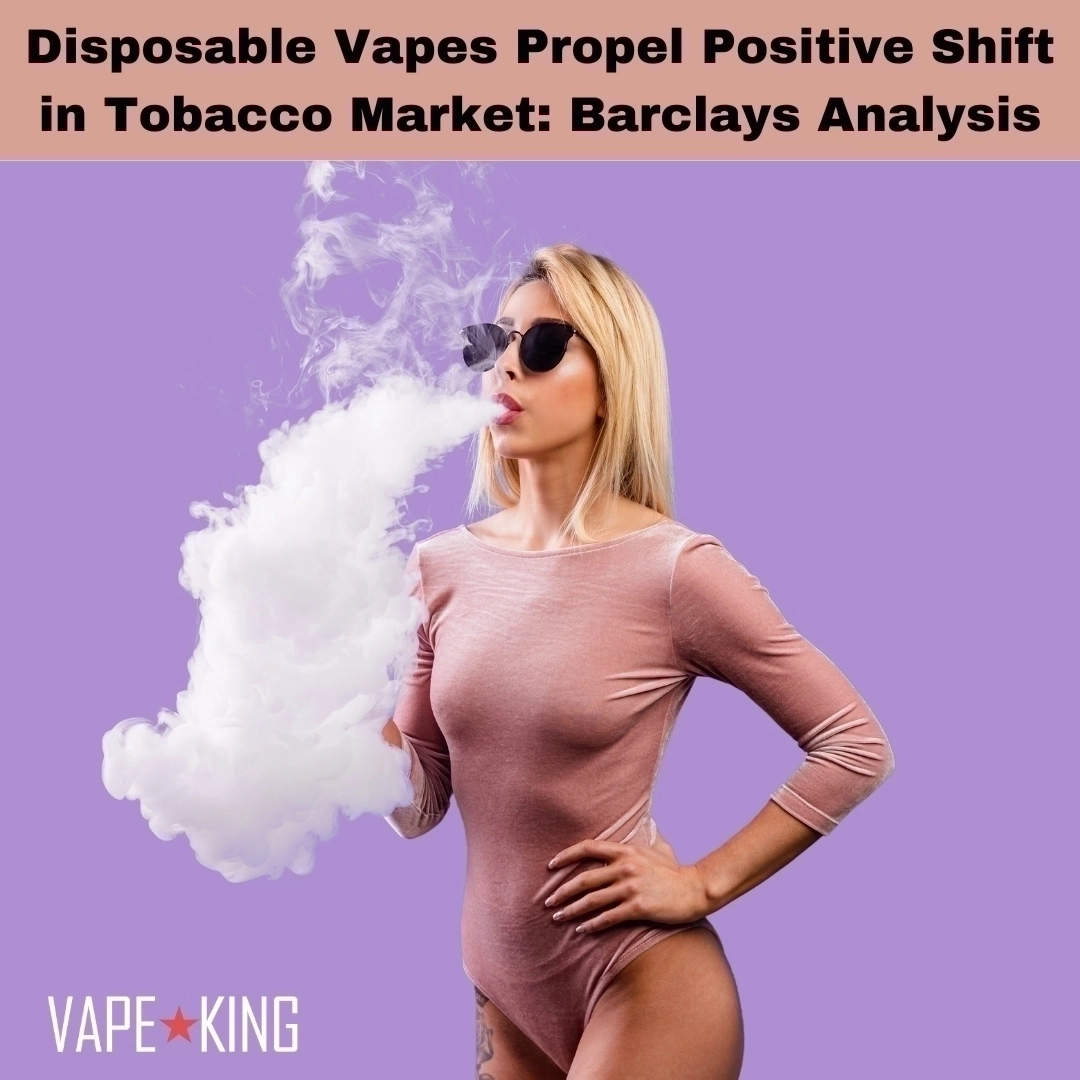Disposable Vape Sales Expected to Propel Positive Shift in Tobacco Market, Barclays Analysis Reveals

A recent analysis released by Barclays Research, the investment research division of the multinational banking corporation, indicates that Altria Group, a prominent U.S. tobacco company, may fail to meet its fiscal year 2024 earnings projections unless the decline in cigarette sales can be reversed through stricter regulations on disposable vapes, However, this decline is viewed in a positive light as it signifies a potential transition towards less harmful alternatives such as disposable vapes.
According to Barclays' projections, Altria's cigarette shipping volumes for fiscal year 2024 are anticipated to decrease by 10 percent, accompanied by a 2 percent decline in EBIT (earnings before interest and taxes), a key metric for profitability assessment.
Barclays suggests that there is a possibility of improvement in U.S. cigarette volumes if regulatory bodies such as the FDA (Food and Drug Administration) and DOJ (Department of Justice) effectively restrict the growth of disposable e-cigarettes. This crackdown could potentially lead to an uptick in cigarette volumes, enabling Altria to achieve its earnings per share guidance of $5.00-$5.15 (approximately ZAR 80.17 - ZAR 96.20).
It is noteworthy that the FDA has not granted authorization for the sale of contemporary disposable vapes, which have surged in popularity in recent times. These products directly compete with cigarettes in retail outlets like convenience stores and gas stations.
Altria endorses PMTA registry laws to enhance cigarette sales.
Altria advocates for PMTA registry laws as a means to bolster cigarette sales. Insights from Barclays shed light on Altria's endorsement of state bills aimed at establishing PMTA registries, which would prohibit the sale of vaping products lacking FDA authorization or still awaiting PMTA review. Some bills permit the sale of products denied by the FDA but allowed by federal court orders, such as R.J. Reynolds' Vuse menthol refills.
Since January, over two dozen PMTA registry bills have been introduced in state legislatures. The Consumer Advocates for Smoke-free Alternatives Association (CASAA) has mobilized support for 21 registry bills, signaling their increasing acceptance among lawmakers. Additionally, Altria executives have voiced support for these bills at legislative hearings across various states, as highlighted by Gregory Conley, legislative and external affairs director for the American Vapor Manufacturers Association (AVM).
These bills aim to curb the sales of popular disposable vapes and bottled e-liquids, which pose competition to Altria's combustible cigarettes, including the Marlboro brand. While disposable vapes also compete with Altria's NJOY e-cigarettes, NJOY holds a relatively minor market share in the vaping industry and in Altria's earnings projections. Notably, R.J. Reynolds, the manufacturer of Vuse along with Newport and Camel cigarettes, also lends support to PMTA registry laws.
States like Alabama, Louisiana, and Oklahoma have already enacted registry laws, maintaining lists of permissible products for sale. Lawmakers in Alabama and Oklahoma have introduced bills this year to strengthen enforcement of these laws.
Both Altria and R.J. Reynolds have pursued legal avenues to suppress their vaping competitors. Last October, Altria subsidiary NJOY filed a lawsuit against numerous manufacturers, distributors, and retailers of disposable vapes, seeking to block imports and hinting at further legal action. (The court dismissed most of the lawsuit in January.)
The FDA plays its role in safeguarding cigarettes.
The FDA diligently safeguards cigarettes through its actions. The FDA Center for Tobacco Products (CTP) has been involved in a prolonged battle with independent vaping enterprises, primarily e-liquid and disposable vape manufacturers and sellers.
The agency has issued numerous warning letters, directing manufacturers and retailers to withdraw products from the U.S. market. Additionally, it has pursued significant financial penalties from repeat offenders. On occasions, the FDA has collaborated with the Department of Justice to close down small vape businesses.
Furthermore, the FDA has confiscated products at airports and instructed import inspectors to detain shipments of Elf Bar and Esco Bar disposables without prior inspection.
To date, the FDA has only approved seven vape devices, all produced by companies owned by Altria (NJOY), Reynolds (Vuse), or Japan Tobacco (Logic). Notably, the agency has not granted marketing authorization for any open-system (refillable) products, including bottled e-liquid, or any vape product featuring a non-tobacco flavor.
What does the rise in disposable vape sales mean for public health?
The rise of disposable vapes presents an opportunity for consumers to reduce their reliance on traditional cigarettes, which are known to pose significant health risks. By embracing disposable vapes, individuals have the opportunity to explore alternative nicotine delivery methods that may be less harmful to their health.
Furthermore, the decline in cigarette sales could lead to a shift in the tobacco industry's focus towards innovation and the development of safer alternatives. This aligns with broader efforts to promote harm reduction strategies and encourage smokers to switch to less harmful nicotine products.
Altria's support for PMTA registry laws underscores its commitment to promoting responsible consumption practices and ensuring product safety. These regulatory measures aim to establish clear guidelines for the sale of vaping products, providing consumers with greater confidence in the products they purchase.
The introduction of PMTA registry laws in various states reflects a growing recognition of the importance of regulating the vaping industry. By implementing these laws, policymakers are taking proactive steps to address public health concerns and promote informed decision-making among consumers.
In addition to regulatory efforts, Altria and other industry stakeholders have taken legal action to address concerns related to vaping products. This proactive approach demonstrates a commitment to upholding industry standards and protecting consumer interests.
Overall, the decline in cigarette sales attributable to the growing popularity of disposable vapes represents a positive development for public health and the tobacco industry. By embracing safer alternatives and supporting responsible regulation, stakeholders can work together to create a healthier and more sustainable future.
No posts found
Write a review


